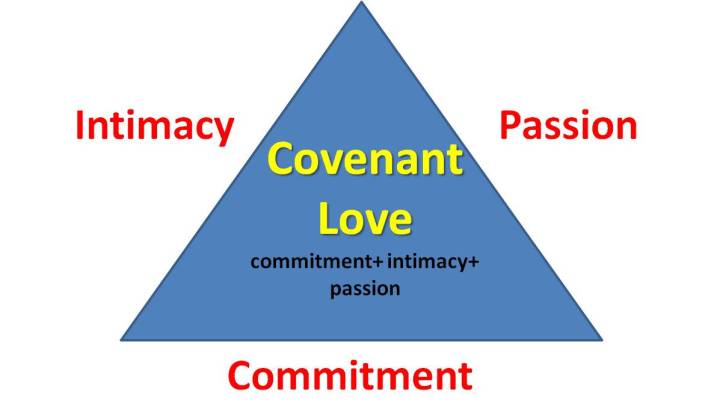Deep love is elusive.
(Part 1 of 2) Especially love that both nourishes us and makes us feel safe. Yet much of life is spent seeking, developing, and trying to improve our loving relationships. After thousands of counseling meetings with couples, I find I have two or three tools which are the most effective at healing unfulfilling relationships. Inevitably, I go to the Triangle Theory of Love.
For my own use, I have adapted slightly the model created by psychologist Dr. Robert Sternberg, now the Professor of Human Development at Cornell University after award-winning teaching at places like Yale, Tufts, and Stanford. As a counselor, I find the Triangle Theory is simple to understand, yet clearly sheds light on why some interpersonal relationships are healthy and others are not. Even more, I have found it can give a couple a practical tool for improving how they love each other.
After years of research on five continents, Sternberg (1988, 1997, 1998, 2004) found that interpersonal love was made up of three parts: Commitment, Intimacy, and Passion. A triangle was used as a metaphor for describing this relationship. Sternberg repeatedly found that all parts were necessary for love in healthy and fulfilling relationships, but that often one factor or another was absent in other kinds of relationships. He concluded that the presence or absence in these components, and their inter-relatedness, produced seven possible types of loving relationships. I’ll examine these seven types of love in my next blog, Will our relationship make it? But now lets examine the model.

Covenant Love
The healthiest relationships shared what I call “Covenant Love.”(1) This is a love which contains all three parts in strong amounts. The word covenant in the Hebrew is berit (at root, to bind or to cut), which for thousands of years has meant, “a mutual and lasting agreement, bond, or pledge confirmed with a vow or oath.” In the Bible, marriage was offered as a covenant agreement, reflecting God’s relationship with his people. It was designed to last, to enrich life, and to produce healthy children. When present, Covenant Love tends to offer both individuals in a relationship great measures of satisfaction, enrichment, tenderness, joy, and security. Covenant love tends to endure, as it fulfills much of what men and women require in deep relationships and marriages. It makes it through the hard seasons. Relationships which deepen over time almost always have all three parts–commitment, intimacy, and passion–working together.
Commitment
Commitment refers to the short-term decision that one makes to love another. I choose you, and not another. In the long-term, commitment is the effectual action required to maintain that love. Commitment love carries a sense of being gracious, forgiving, and unconditional. The Greeks, who had many more detailed words for love, had a word for this kind of commitment love: agape. Agape love, as reflected in God’s love for us, is self-sacrificing and not limited by the partner’s good behavior. It contains factors of mutuality, loyalty, endurance, durability, obligation, and allegiance. For example, my wife and I, in moments of head-banging, have a phrase we use as we work it out: I love you and you’re stuck with me. This is commitment. So, how committed is your relationship?
Intimacy
Intimacy refers to feelings of closeness, connectedness, and bondedness in loving relationships. It includes all that gives rise to the experience of warmth, affection, and emotional togetherness in a relationship. Intimacy is about being known and accepted by another, and knowing and accepting them. It includes mutual understanding and support of a partner, as well as the desire to promote their welfare. Intimacy need not include sexuality for Sternberg, but requires one to share one’s life and heart with another. The Greek words storge and philio speak about this kind of committed, family love and this brotherhood/sisterhood bondedness. People who are intimate give emotional support to each other, speak intimately, and value one another. Like siblings who grew up together, they care for each other, and their actions show it. So, how intimate is your relationship?
(If you desire to know more about how to develop intimacy, suggestions from my doctoral work on interpersonal intimacy are blogged here.)
Passion
Sternberg (1997) writes, “Passion refers to the drives that lead to romance, physical attraction, sexual consummation, and related phenomena in loving relationships.” Passion is about desiring someone; it includes the motivational component of connecting: wanting to be with them, wanting to hear their voice, wanting to touch them, missing them. Passion (Hatfield and Walster, 1981) refers to “a state of intense longing for union with the other.” The Greek used the word eros (where we get the word erotic) to define this kind of desiring, passionate love. In a loving relationship, sexual needs are most often involved, but other needs, like self-esteem, nurture, respect, romance, and belonging are key, too. People who have passion in their relationships look forward to being with each other, and make being together a priority. In my years of counseling, I have noticed that passionate people touch, hold hands, and look into each other’s eyes. So, how is the passion level in your relationship?
For self-evaluation
As you consider your relationships in light of the Triangle Theory diagram above, where are you strongest? Which factor or factors are weakest: commitment, intimacy, or passion? How healthy is your relationship? How balanced? How long will it last?
Would you like to grow in these areas? In my next blog, will our relationship make it? , I will look at the seven types of relationships Sternberg’s research found, and give ideas for improving in each of the three areas.

(1) Sternberg calls this Consummate Love because it has all three factors, but the term “Covenant” carries a biblical history and greater weight which I resonate with. A covenant is more than a contract or agreement. It includes a decision to “work with another so as to make the relationship endure” and an expectation of fruitfulness and blessing when fulfilled. I used the Brown-Driver-Briggs Lexicon’s definition of covenant here.